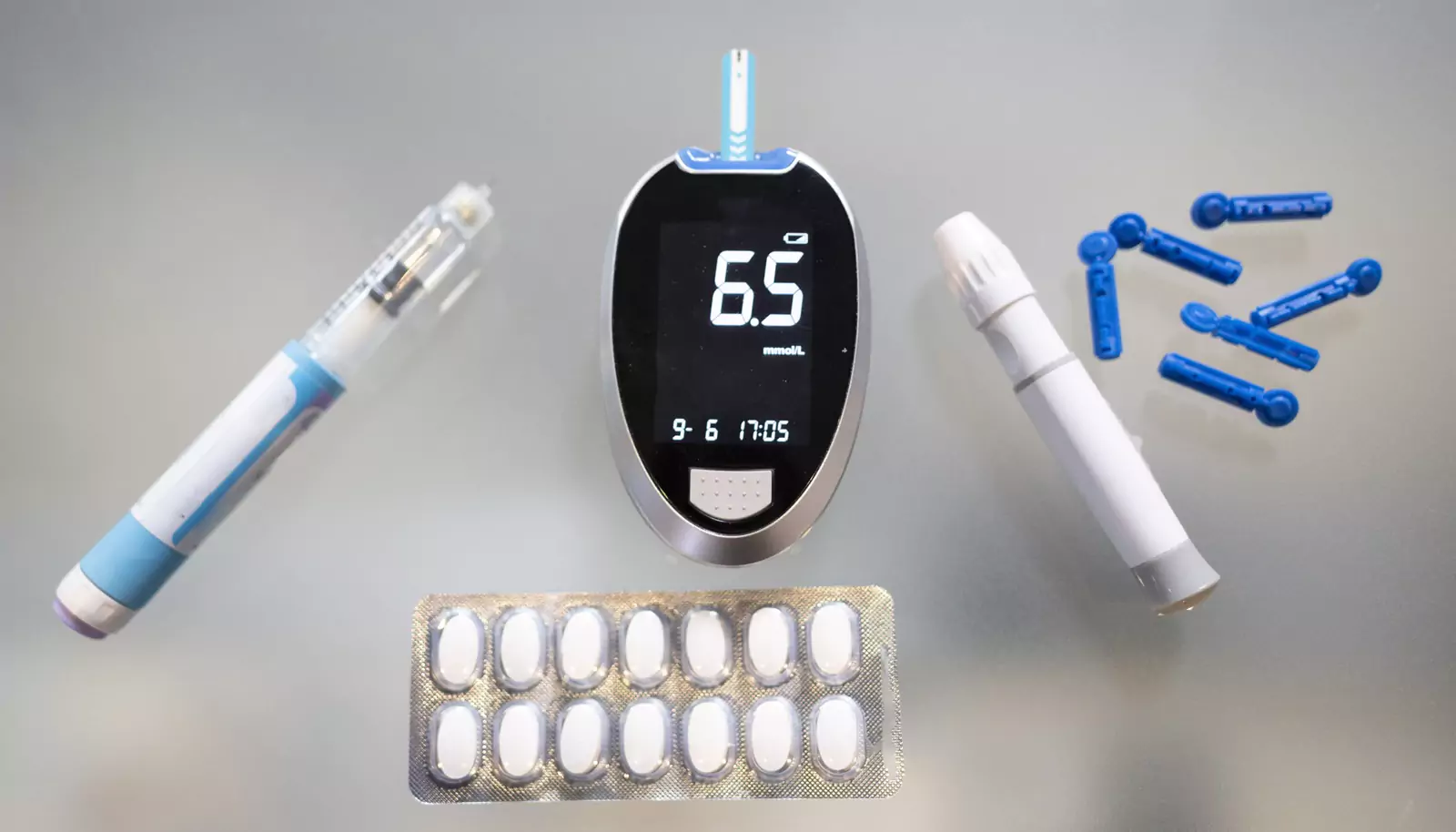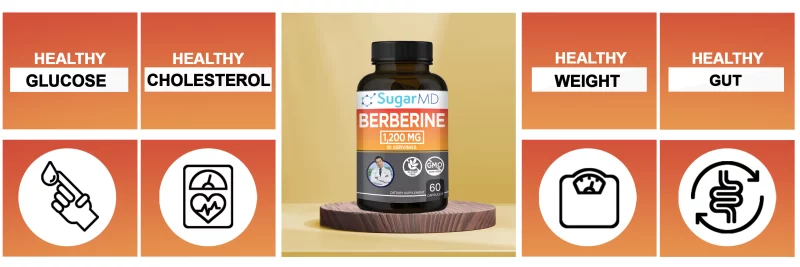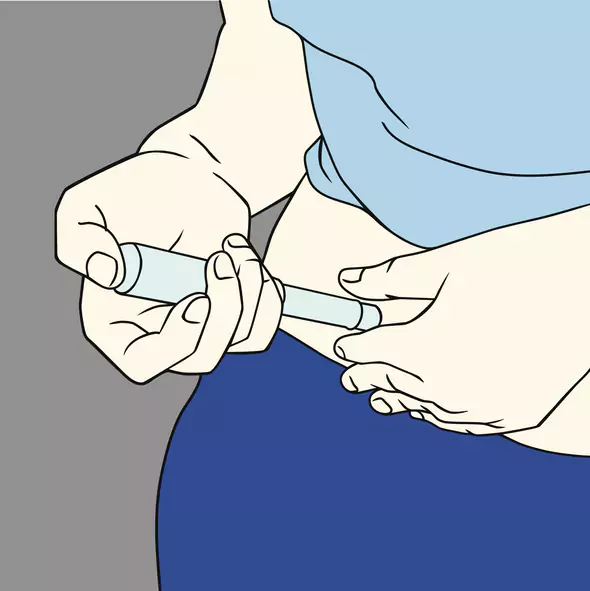
UP TO 40% OFF SITEWIDE






What is a good alternative to Mounjaro for weight loss?


Table of Contents
- Understanding Mounjaro Tirzepatide
- FDA Approval and Clinical Trials
- How Does it Work?
- Why Seek Alternatives to Mounjaro?
- Cost Factors
- Side Effects and Risks
- Injection Site Concerns
- Availability and Prescription Drugs
- Weight Loss Medications: The Basics
- Types of Weight Loss Drugs
- FDA-Approved Medications
- Role of Receptor Agonists
- Importance of Label for Weight Loss
- Natural Alternatives to Mounjaro
- Herbal Supplements
- SugarMD Super Berberine
- Diet and Exercise
- Mindfulness and Weight Management
- The Role of Blood Sugar Levels
- Glucagon-Like Peptide-1 Receptor Agonists
- Control Blood Sugar Naturally
- Blood Sugar and Body Weight
- Lifestyle Changes for Weight Loss
- Diet Plans and Calorie Counting
- Exercise Routines
- Stress Management
- Sleep and Weight Loss
- Risks and Precautions
- Drug Interactions
- Contraindications
- Pregnancy and Weight Loss Drugs
- Long-Term Side Effects
- About The Author
Are you familiar with Mounjaro for weight loss but wondering if there's a better fit for your needs? You're not alone. Mounjaro has been making waves in the weight loss community, but it's not the only option out there. Whether you're concerned about side effects, cost or simply curious about other avenues, this article is your go-to guide.
We'll delve into FDA-approved medications, natural remedies and even lifestyle changes that can serve as good alternatives to Mounjaro for weight loss. So, are you ready to explore your options and make an informed decision? Let's dive in!
Understanding Mounjaro Tirzepatide
Mounjaro Tirzepatide is a relatively new player in the field of weight loss medications. Developed by Eli Lilly, it's a prescription drug that falls under the category of glucagon-like peptide-1 receptor agonists. But what does that mean?
In simple terms, it's designed to mimic the action of certain hormones in your body that regulate appetite and blood sugar levels. The ultimate goal? To help you lose weight and manage type 2 diabetes more effectively.
FDA Approval and Clinical Trials
Now, you might be wondering, "Is this medication safe?" Good question. Mounjaro Tirzepatide has received FDA approval which means it has undergone rigorous clinical trials to prove its efficacy and safety.
These trials are no small feat; they involve multiple phases, hundreds of participants and stringent criteria. So, when you see that FDA-approved label for weight loss on the packaging, you can breathe a sigh of relief. It's been vetted.
How Does it Work?
Let's get into the nitty-gritty. How does Mounjaro Tirzepatide actually help you lose weight? It operates by stimulating the glucagon-like peptide-1 receptors in your body. These receptors play a crucial role in controlling blood sugar and regulating appetite. When activated they send signals to your brain, essentially telling it that you're full.
This helps to reduce food intake, manage blood sugar levels and ultimately assist in weight management. But wait there's more. Mounjaro Tirzepatide also has a positive impact on your body weight by slowing down gastric emptying.
This means that food stays in your stomach for a longer period, making you feel full for an extended time. It's like having a built-in portion control mechanism!
Why Seek Alternatives to Mounjaro?
Cost Factors
Mounjaro Tirzepatide may be a game-changer in the weight loss medications market, but let's talk about the elephant in the room: cost. Prescription drugs like Mounjaro don't come cheap. Even with insurance the co-payments can add up, making it a less accessible option for many.
And if you're paying out-of-pocket? Well, let's just say you might need to tighten your belt in more ways than one. The financial burden can be a significant deterrent for people who are already struggling with weight management.
Side Effects and Risks
Next up, side effects. While Mounjaro has been FDA-approved which means it has passed rigorous clinical trials, it's not without its drawbacks. Common side effects include nausea, vomiting and diarrhea. More severe risks could involve kidney issues or pancreatitis.
These aren't just words on a label for weight loss; they're real concerns that could affect your quality of life. So, if you're someone who's particularly sensitive to medications or has a history of medical issues, this could be a red flag.
Injection Site Concerns
Let's not forget the method of administration: injections. For some the very thought of a needle can be a deal-breaker. But it's not just about needle phobia. The injection site can experience irritation, redness or even infection if not properly managed.
This adds another layer of complexity to the treatment. You'll need to be diligent about hygiene and possibly rotate the injection sites to minimize these issues. It's another thing on the to-do list that might make you wonder if there's an easier way.
Availability and Prescription Drugs
Mounjaro is a prescription drug, meaning you can't just walk into a pharmacy and buy it over the counter. You'll need a doctor's prescription which often requires a thorough medical evaluation, including blood tests to check your blood sugar levels and other markers.
This process can be time-consuming and may even involve multiple visits to healthcare providers. And what if you live in a rural area or a place where specialized healthcare is not readily accessible? The hurdles can quickly multiply.
Weight Loss Medications: The Basics
Types of Weight Loss Drugs
When it comes to shedding those extra pounds the market is flooded with options. From over-the-counter pills to prescription drugs the variety can be overwhelming. But here's the thing: not all weight loss medications are created equal. Broadly they can be categorized into appetite suppressants, fat blockers and metabolic boosters.
Each type targets a different aspect of weight management. So, before you jump on the bandwagon, it's crucial to understand what you're getting into. Are you looking to control your appetite? Or perhaps you're more interested in blocking fat absorption? Knowing the types can help you make an informed decision.
FDA-Approved Medications
Now, let's talk about the gold standard: FDA-approved medications. These are the crème de la crème, having undergone rigorous clinical trials to prove their safety and efficacy. But remember, FDA approval doesn't mean a free pass. It means the medication has met specific criteria for safety and effectiveness.
So, when you see that FDA-approved label for weight loss, it's not just a marketing gimmick. It's a sign that the medication has been scrutinized and passed the test. However, it's essential to consult your healthcare provider for personalized advice, especially if you have pre-existing conditions like type 2 diabetes or high blood sugar levels.
Role of Receptor Agonists
You've probably heard terms like "glucagon-like peptide-1 receptor agonists" thrown around, especially if you've been researching alternatives to Mounjaro. But what do they mean? Simply put, receptor agonists are compounds that activate certain receptors in your body.
In the context of weight loss they often target receptors that regulate appetite and blood sugar levels. By activating these receptors the medication can help you feel fuller for longer and control blood sugar, aiding in weight management. It's a fascinating field that's gaining traction, but it's not without its complexities.
Importance of Label for Weight Loss
Last but not least, let's discuss the label for weight loss. It's not just a piece of paper; it's a treasure trove of information. From the list of active and inactive ingredients to the recommended dosage and potential side effects the label tells you everything you need to know. And in the case of prescription drugs, it often includes FDA approval status. So, don't just toss it aside.
Read it, understand it and if you have questions ask your healthcare provider. It's your first line of defense in making sure you're choosing a medication that aligns with your weight loss goals and health status.
Natural Alternatives to Mounjaro
Herbal Supplements
If the idea of taking prescription drugs for weight loss doesn't sit well with you, you're not alone. Many people are turning to herbal supplements as a natural alternative to Mounjaro and other weight loss medications. From green tea extracts to Garcinia Cambogia the options are plentiful.
But here's the kicker: not all herbal supplements are created equal. Some may offer minimal benefits, while others could interact with medications you're already taking. So, if you're considering this route, it's crucial to consult a healthcare provider.
They can help you navigate the maze of natural ingredients and find a supplement that aligns with your weight management goals.
SugarMD Super Berberine
Speaking of natural ingredients, let's talk about SugarMD Super Berberine. This supplement is a standout in the crowded field of herbal options. Why? Because it's specifically formulated to maintain healthy glucose metabolism and reduce inflammation.
It combines dihydroberberine with 100% pure Ceylon cinnamon, aiming to keep your blood sugar levels in check. This is particularly important if you're dealing with type 2 diabetes alongside your weight loss journey. Plus, it's safe for long-term use, making it a viable alternative to Mounjaro for those who prefer a more natural approach.

Diet and Exercise
No discussion about natural alternatives to Mounjaro would be complete without mentioning diet and exercise. It may sound cliché, but the importance of a balanced diet and regular physical activity can't be overstated. From controlling blood sugar to aiding in weight management the benefits are multifaceted.
And guess what? You don't need a prescription for a jog in the park or a plate of veggies! The key is consistency. Small, sustainable changes can lead to significant results over time. So, if you're looking for a drug-free way to lose weight, don't underestimate the power of good old-fashioned diet and exercise.
Mindfulness and Weight Management
Last but not least, let's delve into the mental aspect of weight loss. Mindfulness techniques, such as meditation and mindful eating, are gaining traction as effective tools for weight management.
The idea is simple: by being present and fully engaged in the moment, you can make more conscious choices about what you eat and how you move. It's not just about counting calories or steps; it's about understanding your body's signals and responding in a way that supports your health and well-being.
The Role of Blood Sugar Levels
Glucagon-Like Peptide-1 Receptor Agonists
When discussing weight loss medications like Mounjaro, one term that frequently pops up is "glucagon-like peptide-1 receptor agonists," or GLP-1 RAs for short. These are a class of medications that have a dual role: they not only aid in weight loss but also help control blood sugar levels.
How do they do this? By mimicking the action of the glucagon-like peptide-1 hormone which is naturally produced in your gut. When you eat, this hormone signals your pancreas to release insulin, helping to lower blood sugar.
It also sends a "full" signal to your brain, reducing appetite. So, in essence, GLP-1 RAs can be a two-for-one deal for people dealing with both weight issues and type 2 diabetes.
Control Blood Sugar Naturally
But what if you're not keen on taking medications? Are there natural ways to control blood sugar? Absolutely. Diet plays a pivotal role here. Foods rich in fiber, protein and healthy fats can help stabilize blood sugar levels. Exercise is another key player.
Even a simple 30-minute walk can have a significant impact on your blood sugar. And let's not forget stress management. High stress levels can lead to cortisol release which in turn can spike your blood sugar. Techniques like deep breathing, meditation and even a good night's sleep can help keep those levels in check.
Blood Sugar and Body Weight
Now, you might be wondering, what's the connection between blood sugar and body weight? It's more intertwined than you might think. High blood sugar levels can lead to insulin resistance, where your body's cells stop responding to insulin effectively.
This can cause more sugar to be stored as fat, leading to weight gain. On the flip side, weight loss can improve insulin sensitivity, making it easier to control blood sugar levels. It's a cycle, but one that you have the power to influence. Whether through medication, diet or lifestyle changes, managing your blood sugar can be a crucial component of your weight management strategy.
Lifestyle Changes for Weight Loss
Diet Plans and Calorie Counting
When it comes to weight loss, medications like Mounjaro might offer a quick fix, but lifestyle changes often provide a more sustainable solution. Let's start with diet plans and calorie counting. You've probably heard the phrase "you are what you eat," and it's not far from the truth.
A balanced diet rich in fruits, vegetables, lean proteins and whole grains can go a long way in aiding weight management. But it's not just about what you eat; it's also about how much. Calorie counting can be an effective tool for keeping your portions in check.
There are numerous apps and websites designed to help you track your caloric intake, making it easier than ever to stay on course.
Exercise Routines
Next up, exercise routines. Physical activity is a cornerstone of any effective weight loss strategy. Whether it's cardio, strength training or a mix of both, exercise helps you burn calories and improve your metabolic rate. But here's the catch: consistency is key.
A 30-minute jog once a week won't cut it. Aim for at least 150 minutes of moderate-intensity exercise per week as recommended by healthcare providers. And don't forget to mix it up. Variety not only keeps you engaged but also ensures that you're working different muscle groups, maximizing your weight loss potential.
Stress Management
Now, let's talk about stress. Believe it or not, stress can be a significant roadblock on your weight loss journey. When you're stressed, your body releases cortisol, a hormone that can lead to weight gain. Stress can also trigger emotional eating, sabotaging your diet plans.
So, what's the solution? Stress management techniques like deep breathing, meditation and even simple walks can help keep your stress levels in check. And remember, it's not just about reducing stress; it's about finding healthier ways to cope with it.
Sleep and Weight Loss
Last but not least, sleep. Often overlooked, sleep plays a critical role in weight management. Lack of sleep can mess with your hunger hormones, leading to increased appetite and, ultimately, weight gain. Aim for at least 7-8 hours of quality sleep per night. Not only will it help you control your weight, but it will also improve your mood, focus and overall well-being.
Risks and Precautions
Drug Interactions
While medications like Mounjaro can offer a promising pathway to weight loss, it's crucial to be aware of potential drug interactions. If you're already on medication for conditions like high blood pressure, diabetes or even mental health issues, adding a weight loss drug to the mix can be tricky.
Some medications can either amplify or negate the effects of Mounjaro, leading to unintended consequences. For example, certain blood sugar medications may interact adversely, causing dangerously low blood sugar levels. Therefore, it's imperative to consult your healthcare provider for a comprehensive medication review before starting any weight loss drug.
Contraindications
Contraindications are another critical aspect to consider. These are conditions or factors that make the use of a particular medication inadvisable. For instance, if you have a history of pancreatitis, kidney issues or severe liver disease, Mounjaro and similar weight loss medications may not be suitable for you.
Even certain allergies can be a contraindication. Always provide a complete medical history to your healthcare provider, including any over-the-counter medications or supplements you're taking, to ensure that the drug is appropriate for your specific health profile.
Pregnancy and Weight Loss Drugs
The topic of pregnancy and weight loss drugs is a sensitive one. Most weight loss medications, including Mounjaro, are not recommended during pregnancy due to the potential risks to the fetus.
If you're planning to become pregnant or discover that you are pregnant while on a weight loss medication, consult your healthcare provider immediately. They can guide you through the process of safely discontinuing the medication and may suggest alternative methods for managing your weight during pregnancy.
Long-Term Side Effects
Last but not least, let's discuss long-term side effects. While the immediate side effects of weight loss drugs are often well-documented the long-term effects can be less clear. Some medications may lead to nutrient deficiencies over time, while others could potentially increase the risk of cardiovascular issues.
It's also worth noting that the long-term efficacy of these drugs in sustaining weight loss is still a subject of ongoing research. Therefore, it's essential to consider these medications as part of a broader weight management strategy which includes diet, exercise and regular medical check-ups.
About The Author
Meet Dr. Ahmet Ergin a highly skilled and dedicated endocrinologist with a passion for diabetes care. Dr. Ergin earned his medical degree with honors from Marmara University in Istanbul. He completed internal medicine residency and endocrinology fellowship at Cleveland Clinic.
Dr. Ergin is board-certified in Internal Medicine, Endocrinology, Diabetes and Metabolism due to his vast medical expertise. He's a certified diabetes educator, author of "The Ultimate Diabetes Book," and founder of "the SugarMD YouTube channel."
Dr. Ergin offers exceptional diabetes care to his patients in Port Saint Lucie, FL, helping them manage effectively. Disclaimer: These statements have not been evaluated by the Food and Drug Administration. Information on this website isn’t intended to treat, cure or prevent any disease. Discuss with your doctor and do not self-treat.
Written By Dr. Ahmet Ergin
466 total articles
Meet Dr. Ahmet Ergin, a highly skilled and dedicated endocrinologist with a passion for diabetes care. Dr. Ergin earned his medical degree with honors from Marmara University in Istanbul. He completed internal medicine residency and endocrinology fellowship at Cleveland Clinic. Dr. Ergin is board-certified in Internal Medicine, Endocrinology, Diabetes, and Metabolism due to his vast medical expertise. He's a certified diabetes educator, author of “The Ultimate Diabetes Book,” and founder of “the SugarMD YouTube channel.” Dr. Ergin offers exceptional diabetes care to his patients in Port Saint Lucie, FL, helping them manage effectively. For a closer look into his insights and experiences, connect with Dr. Ahmet Ergin on LinkedIn, Instagram, and YouTube.”
Disclaimer: These statements have not been evaluated by the Food and Drug Administration. Information on this website isn't intended to treat, cure or prevent any disease. Discuss with your doctor and do not self-treat.
Products









